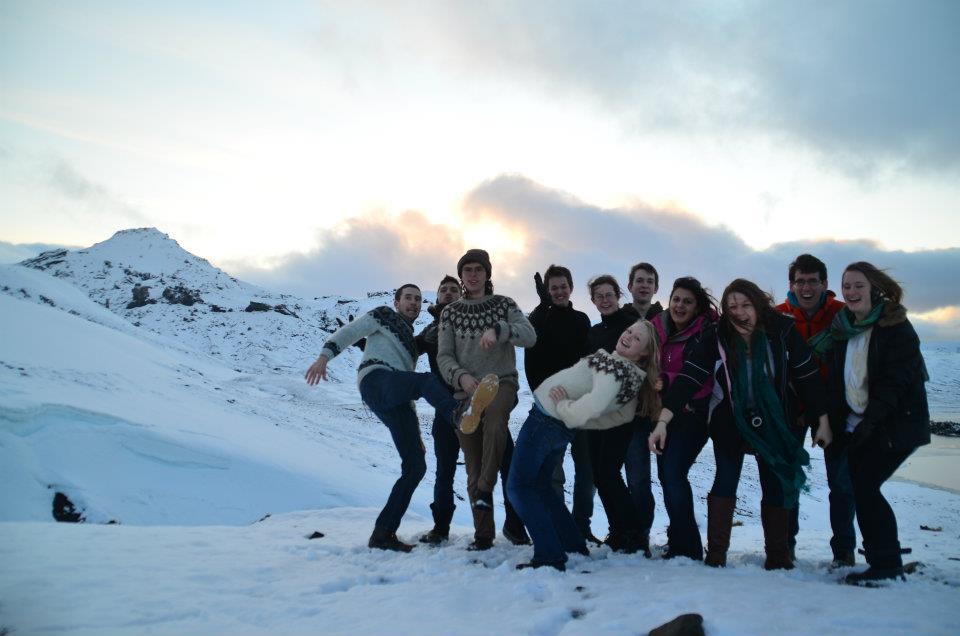Return to the search form Return to your search results
University of Iceland Exchange
Fast Facts
Sessions Offered:
Fall, Spring, Academic Year
Location:
Reykjavik, Iceland
Credit:
- Transfer
Eligibility:
- Minimum 3.0 GPA
- Junior standing.
- No Language Requirement
Application Due:
- Spring 7/15
- Fall - 2/15
Program Cost:
- Standard UI Tuition and Fees
- Click the Application tab for more details

Iowa exchange students at Oddastaðavatn
A Reciprocal Exchange agreement between the University of Iowa and the University of Iceland allows UI students to undertake a year, or semester of study in Rejkjavik alongside local students in English taught classes.
This program requires students to function independently in a different university system where English is not the first language. The University of Iceland Exchange would be a good fit for a student who is a confident and experienced traveler with a drive and willingness to navigate a new educational system independently.
Academic Program

view from Hallgrimskirka Church tower
The academic year is divided into two semesters, autumn and spring, each semester lasting thirteen weeks.
The University of Iceland offers courses across various areas of study. Students studying at the University of Iceland must take a total of 30 ECTS credits per semester, where at least 60% of courses are within the students’ major. To look at a list of available course, visit the University of Iceland website here.
To help exchange students get a good start, the University of Iceland has a well-organised mentor system. The main task of the mentor is to provide the exchange student with practical information about the University of Iceland and Icelandic society, as well as to introduce them to other students and student life in general.
For More Information
Steps to Studying Abroad
- To begin students must complete a Discover Study Abroad session at the University of Iowa.
- After completing the Discover Abroad session, students must call the Study Abroad office at 319-335-0353 to be assigned to the appropriate study abroad advisor.
- Once assigned, students must meet with their study abroad advisor to receive program application instructions.
Study Abroad
1111 University Capitol Centre
Iowa City, IA 52242
Phone: 319-335-0353
Email: study-abroad@uiowa.edu
University of Iceland
Founded in 1911 in the capital city of Reykjavik, the University of Iceland now enrolls nearly 5,500 students in four faculties or colleges (social sciences, humanities, education, and engineering and natural sciences). Each faculty is comprised of various departments. Please note that applicants will have to choose a specific college within the University of Iceland to apply to. Unlike most American universities, students here must be admitted into a particular college in order to study, and that is where they do the vast majority of their university coursework. Admitted students will also have to choose a primary college, but are sometimes able to take a class or two outside of that particular college.
Iceland
An island known for its high standard of living, a 100% literacy rate (the highest in the world), and its curious juxtaposition of ice and fire in the form of glaciers and geothermal geysers, Iceland lies in the North Atlantic Ocean just east of Greenland and just below the Arctic Circle.
Icelandic summers are cool and damp; winters are made habitable (temperatures rarely fall below freezing) by the warming influence of the Gulf Stream. Not surprisingly, most Icelanders live in the fertile coast lands where fishing and agriculture comprise important sectors of the economy.
Although discovered by the Irish nearly a hundred years earlier, Iceland was first settled by the Norse in the late 9th century. The island later came under Norwegian and then Danish rule, became a separate state with unlimited sovereignty in 1918, and was declared an independent republic in 1944. The approximately 250,000 inhabitants of this island-nation today speak a language which is descended from, and still surprisingly similar to, Old Norse.
US Department of State Country Information
The US Department of State provides safety and security information for every country of the world to help you assess for yourself the risks of travel. Each country information page contains a Travel Advisory, Alerts, and other important details specific to that country that could affect you.
Pay close attention to the entry and exit requirements, local laws and customs, health conditions, and other details to help decide whether traveling to any given country is right for you. Non-US citizen travelers may also wish to seek guidance from the embassy of their country of citizenship. The UI International Travel Policy for Students addresses restrictions on student travel to high-risk locations and engagement in high-risk activities abroad.
Living Arrangements
The University of Iceland does not provide or guarantee housing for students. On-campus housing is extremely limited so most students live off-campus. The Student Housing Office offers a limited supply of on-campus housing for students. The University of Iceland partners with Housing Anywhere where students can sign-up to an online searching and booking platform for booking accommodations. Registered students at the University of Iceland get priority access. Students can safely book their new room, offered by verified private landlords and outgoing students through Housing Anywhere. More information can be found on the University of Iceland's Housing web site.
Passport
US Citizens
If you do not have a passport, it is important that you apply for one as soon as possible to ensure you receive it before the program begins. US citizens can find more information about how to apply for a passport on the US Department of State’s website.
Students with a valid passport should check the expiration date. Passports must be valid for at least 6 months AFTER the anticipated return to the US from studying abroad. If your passport is not valid for at least 6 months after your anticipated date of return to the US, you must renew your passport before applying for a visa or leaving the United States.US citizens can find more information about how to renew a passport on the US Department of State’s web site.
Travel Arrangements
Students make their own travel arrangements to arrive in Reykjavik by the required date. Information for arrival will be provided by the University of Iceland’s Office of International Education.
Eligibility
This program is open to UI students who fulfill the following requirements:
Good academic and disciplinary standing - It is the policy of the UI Study Abroad office that all students who study abroad must be in both good academic standing and good disciplinary standing at the time of their application. Students who, even after being accepted into a program, are put on either academic and/or disciplinary probation for any period of time overlapping with the study abroad program dates are ineligible to study abroad. In these cases, students must forfeit their acceptance and will not be allowed to study abroad. Any student who must forfeit their acceptance and/or attendance on a study abroad program due to a probationary status is wholly responsible for any and all financial expenses incurred.
Costs
Students will be responsible for paying many of their program costs through their University of Iowa U-Bill, while other costs will be out-of-pocket costs paid by the student directly to vendors before and after going abroad. Refer to the cost sheets below for details on the costs associated with this program.
The cost sheets outline the total estimated costs associated with participating in this program and can be used for financial aid purposes. They include fees charged on students’ U-Bill as well as out-of-pocket expenses. Actual out-of-pocket expenses will vary from individual to individual. Quoted estimates are conservatively high, yet realistic.
Costs charged to the U-Bill
- Application fee (charged at the time of application, before financial aid/scholarships disburse)
- University of Iowa Tuition and fees (charged shortly before departure)
- University of Iowa Study Abroad Administrative Fee (charged shortly before departure)
- The mandatory Iowa Regents International CISI Health Insurance (charged shortly before departure)
 University of Iceland Exchange program Cost Sheet for Spring 2022
University of Iceland Exchange program Cost Sheet for Spring 2022
Out-of-pocket costs (not charged to U-Bill)
- Food (paid by student at their discretion while abroad)
- Round trip airfare (paid by student directly to travel agent or airline- approx. 6-8 weeks prior to departure, before financial aid/scholarships disburse)
- Local transportation (paid at student’s discretion while abroad)
- Passport (paid by student prior to departure, before financial aid/scholarships disburse)
- Consular and visa fees (paid by student prior to departure, before financial aid/scholarships disburse)
- Textbooks, copyright permission fees, course packets, and other course-related materials (paid upoon arrival to your host country)
- Medical exam/immunizations (paid by student as needed prior to departure, before financial aid/scholarships disburse)
- Personal expenses and personal travel (paid by student as needed while abroad)
- Rental or purchase of required cell phone- does not include usage fees (paid as needed while abroad)
Scholarships and Financial Aid
Most financial aid (scholarships, grants, and loans) is applicable to study abroad programs. Please check the Study Abroad website for information on financial aid and how it may be applied to studying abroad. You are also encouraged to speak with someone at the Office of Student Financial Aid to explore financial aid options. Scholarship opportunities exist for study abroad participants. Please explore Study Abroad’s websites for UI Study Abroad Scholarship Opportunities.
How to Apply
Spots for UI students: Enrollment for the Spring 2024 session is limited to 2 semester students.Steps to Studying Abroad
- Before initiating an application, students must complete a Discover Study Abroad session at the University of Iowa.
- After completing the Discover Abroad session, students must call the Study Abroad office at 319-335-0353 to be assigned to the appropriate study abroad advisor.
- Once assigned, students must meet with their study abroad advisor to receive program application instructions.
Students will need to complete a University of Iowa Study Abroad application.
Application Deadline
Applications for the Fall and Academic Year sessions are due on February 15.
Applications for the Spring session are due on July 15.
Students are encouraged to review the following:
Iowa Regents CISI Health Insurance Information
Health preparation Guide for International Travel
This document is intended to help you plan for your medical needs abroad.
Please DO NOT turn this form in to UI Study Abroad.
Orientation
In order to prepare for your time abroad, you are required by the University of Iowa to complete two orientations. These may be in addition to orientations provided by your on-site provider. See below for more information.
Online Education Abroad Pre-Departure Orientation
You are required to complete the International Programs ICON course "Education Abroad Pre-Departure Orientation" prior to departure. This orientation is mandatory for all students going abroad under the auspices of the University of Iowa. It covers many practical matters about living overseas, such as health and safety, communication, money, goals, and much more. You will be enrolled in this course by International Programs and an email will be sent to you once enrolled. If you have any questions, you can email safety-abroad@uiowa.edu
Program-Specific Orientation
This orientation will be facilitated by a study abroad advisor and will cover content specific to the University of Iowa including but not limited to, billing, insurance, the Credit Approval Form (CAF), and transcripts. It could be conducted in a group setting or one-on-one depending on your type of planned activity abroad. Your study abroad advisor will send you more information about this mandatory in-person session.
